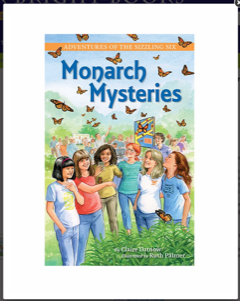YA Eco Mysteries, Memoirs, Novels & Travel
Emerging Genre of Climate Fiction
The Emerging Genre of Climate Fiction
Why do I write Climate Fiction?
The gale force winds of climate change are calling. They’re calling to scientists, writers, and artists to weave stories that will inspire the citizens of tomorrow to dream up a brighter future.
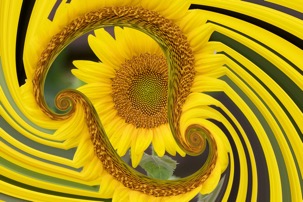
Photo credit Boris Datnow
Understanding the impact of climate change is an essential step toward preparing ourselves to become knowledgeable, active, and just stewards of our state’s and our planet’s natural environment adversely impacted by climate change. I do not sugar coat the truth but, hopefully, my stories inspire kids to feel hope and to take action for the future.
Eco fiction can be as diverse as our natural world, and impact all kinds of communities and families. It is multicultural, diverse, Gobal—and with animals too.
“Because It’s real . . . It’s Us . . . There’s Hope.”
I do not sugar coat the truth but my stories inspire kids to take action for the future.
“Cli-Fi is teaching us about the world as we NEED TO SEE IT: a planet in the GRIP of a climate crisis.” Theodora Sutcliffe
Eco fiction can be as diverse as our natural world, and impact all kinds of communities and families. It is multicultural, diverse, Gobal—and with animals too.
My Book Recommendations:
Fiction (for the Young at Heart)
Midnight Zoo by Sonya Harnett
The Zoo at the Edge of the world Eric Kahn Gale
the Green Glass Sea by Ellen Klages
Hoot by Carl Hiaasen
The Thing About Jelly Fish by Ali Benjamin
Memory of Water by Emmi Itaranta
The Summer Book by Tova Jannsson
Adult Fiction:
Flight Behavior by Barbara Kingsolver
The Overstay by Richard Powers
Maddaddam Trilogy by Margaret Atwood
Dune by Frank Herbert
Annihilation by Jeff VanderMeer
Bearskins by Annie Proulx
Memory of Water by Emma Itaranta
Arctic by Kim Stanley Robinson
Gun Island by Amitav Ghosh
NonFiction:
Naturalist E.O. Wilson (a memoir)
The Big Burn by Timothy Egan
Gone to the Woods by Gary Paulsen (memoir)
The World in a Whale by Rebecca Giggs
How to Change everything by Naomi Klein
Miseducation: How Climate Change is taught in America by Katie Worth
Links to Websites with Book Recommendations.
https://writersrebel.com/category/read/page/2/
https://ashlandcreekpress.com/books/
https://climate-fiction.org. (Climate Fiction Writers League)
https://dragonfly.eco/indie-corner-claire-datnow/
https://dragonfly.eco/the-winds-of-change-childrens-environmental-climate-fiction/
https://dragonfly.eco/dragonfly-library/
https://mediamint.net/page7/files/Climate%20Change%20Fiction%20for%20Kids.html
https://www.teenlibrariantoolbox.com/2021/03/climate-change-fiction-multicultural-diverse-global-and-with-animals-too-a-guest-blog-by-author-claire-datnow/
Videos:
You can view the video of the Climate Change Panel presentation at the Environmental Education Association of Alabama, February 2022 on YouTube at: https://youtu.be/Pa5aJQ4T2Fw
Eco Fiction Writer's Blog Episode 4
What’s Whale Poop Got To Do With You?
Whale poop plays a major role in maintaining the cycle of aquatic life and that makes whales important “climate change warriors".
Episode 4: Backstory: A year ago to the day, on her thirteenth birthday, Alysie Muckpa had dared to stow away on the Moby, the research vessel, where her oldest girl cousin, Valentine Muckpa, worked with a crack team of marine scientists. They had come to Nahoon to investigate a mystery: Why so many gray whales were washing up dead on the coast, along their 12,000 mile round trip between Alaska and Baja, Mexico.
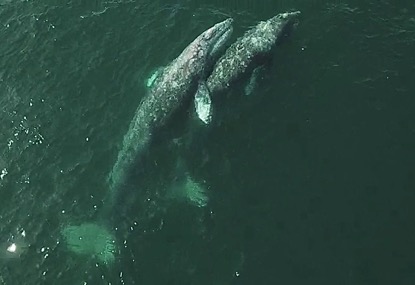
Photo Credit: Gavriel Berghouse
Excerpted from Chapter 5. Aboard the research vessel, Moby, Nahoon Bay, Alaska
The news was grim. By the end of May five dead whales had washed on shore near Nahoon. At last count at least 60 other whales had died along the West Coast.
“That is the highest number in two decades,” Valentine declared. “Scientists call this an Unusual Mortality Event or UME.”
“Do you know why the whales are dying in agony, the way Natsilane, our gray, whale did?” Alysie swallowed a lump forming in her throat.
Valentine shook her head, “No.” She leaned on the ship’s rails and stared into the distant mountains, ringing the bay. Alysie watched the emotions flickering across her cousin’s face: grief, anger, frustration—and then, finally, determination.
Valentine straighten her back, rubbed her hands together, and then seeing the sheen of tears in Alysie’s eyes, said.“Don’t worry. My team will keep on going until we find out what’s harming the whales.” Reaching over, she squeezed her young cousin’s hand.
Alysie gave a tremulous smile. That’s what I love about science, she thought. Scientists are nature detectives, searching for clues, to solve a mystery to stop the bad actors from doing harm.
Then remembering why she had come to visit her cousin, Alysie asked, “Did you find the real cause of Natsilane’s death?”
Valentine who had been bombarded by daily her texts from Alysie said, “The good news is that we found promising clues,” she paused, “Natislane blubber was thinner than it should have been perhaps indicating he wasn’t getting enough nourishment—.”
“I knew it. He starved to death!” Alysie clenched her fists by her side.
"Whoa! hold on, Alysie. Scientists have gathered data showing that gray whales washing up on the beaches are undernourished," Valentine said. “But researchers will need to collect more data—that is what science is all about
In the ship’s galley, Captain Erich was enjoying smoked salmon, his favorite snack. “So how is your young student progressing?” He asked, raising his eyebrows.
“Oh, she’s doing great, thanks captain,” Valentine responded.
Alysie forced a smile. She hated it when adults, like Captain Erich, talked about her as if she wasn’t there.
Finishing his sandwich in one big bite, he turned to Alysie, “You understand Valentine and the crew on this ship have important work to do. ”
Although Alysie tried not to show it, the captain always found a way to make her feel like a little kid.
When the captain was out of earshot, Valentine said, “Don’t mind Captain Erich, his barks is worse than his bite.” She stirred hot water and chocolate into two mugs. “But sometimes he just pisses me off.”
“I know,” Alysie surpassed a giggle.
With their hands wrapped around the mugs, Alysie picked up the conversation where they had left off. “Valentine, if whales are dying from starvation, is it because there isn’t enough food for them? If so why isn’t there?”
“Great questions. Researchers have found a connection between the lack of food for whales and climate change.”
“Wow, climate change?” Alysie asked. “How have they connected the dots between whales going hungry and climate change?” Opening her sketchbook, Alysie drew two dots, labelling one Food, and the other Climate Change.
Alysie laughed, “Oh, thanks for the compliment. I’m going to keeping working on it before can hand it in to my science teacher for a grade.”
“You should add one more label,” Valentine said. Alysie draw a dot and filled it in, then held her pencil poised, “Label it the Whale Poop Pump.”
“That sounds icky.” Alysie made a face.
Valentine checked her watch. “We’re just about out of time, so I’ll make this brief. Nutrient-rich whale poo helps reverse the effects of climate change.”
Alysie leaned forward to catch every word as Valentine was talking rapidly. “When whales come up to breath, they also poop. Whale poop is filled with iron and nitrogen. Without these two elements and sunlight, plankton cannot reproduce and grow
While Valentine was busy helping Captain Erich, the first lines of a limerick just popped into Alysie’s head.
There was a gray whale with a baleen beard
Who said, “It is just as I feared,”
She chewed on the end of the pencil and then continue to scribble
Too little plankton, not enough iron or nitrogen, too few crustaceans,
Warming oceans, melting ice, shrinking plankton stations
Have caused my whale poop plumes to disappear
I sadly fear
Alysie frowned, crossed out the word disappear and was searching for another word to rhyme with ‘feared’ when she heard Valentine say, “I added some items captain.” Herr cousin return the list to the captain who nodded curtly. Before exiting he said, “Valentine your little shadow sure likes to follow you around.”
Alysie felt the heat burning on her cheeks. She was grateful that Valentine turned her back to him, ignoring his remarks, and picked up the conversation where they had left off. “Okay where were we, Alysie?”
“Whales are like trees!” Alysie said.
“They’re are,” Valentine agreed.
“Yay!”Alysie stood up and pumped her fist into the air. Then she through her arms around Valentine. “Thank you,” she said, “I just love science!”
“What’s not to love about science—you can literally change the world with the power of science.”Valentine hugged her cousin. “Your welcome,” she said.
Alysie took a deep breath to calm herself. “Valentine, can I join the research —” Before Alysie could finish her sentence, Dr. Rostov, the lead biologist, walked into the galley. His ice-gray eyes were red from lack of sleep.
Valentine stood up briskly, “Time to get to work.”
Dr. Rostov said, “Guess it’s time for you to head home, Alysie. “Hope you enjoyed your visit on the Moby.”
As she watched the two leave, Alysie felt as if someone had slammed a door in her face. She had high hopes that the team would be impressed by her leading them to Natsilane, and by the way she had helped at the necropsy. Obviously, they hadn’t been or the would ave invited her to join their team. She felt disappointed, empty and hollowed out.
On the way home, she told herself, I’ve got to find another way to prove myself. Straightening her shoulders, she marched on. The wind in the bare branches seemed to whisper back: Prove yourself, Prove yourself.
Eco Fiction Writer's Blog Episode 3

Gray Whale Mother and Calf off the Coast of California (Gavriel Berghouse)
Like uncorking a bottle of champagne, ideas pop and fizz in my head. I snare a few to weave into the story
Here are the latest titles that I’m considering for Book 2 of the Climate Change Trilogy: Fire, Water, and Air.
1. “The Time Has Come,” The Whale Said (Book 2 Water)
2. The Whale’s Lament (Book 2 Water)
3) Three Amigos and a Magnificent Whale (Book 2 Water)
4)Whalefall (Book 2 Water)
Please let me know which title you prefer? Email me at: cldatnow@me
Note: Red Flag Warning: An Eco Adventure (BooK1. Fire) is the first published book in the Climate Change Trilogy.
In preparation for Chapter 3, I researched the scientific facts governing the phenomenon of a whalefall.
Summary of Chapter 3: Alysie Muckpa, the teenage protagonist of the story, hears the gray whale Natislane calling to her, “The time has come!”
She begs the whale not to come closer to the shore, but he washes up on the beach. Without water to keep him afloat, the weight of Natsilane’s gigantic body begins to crush his internal organs. Alysie is heartbroken at the death of her whale. But she learns that as smelly as 100 tons of decomposing flesh can be, a dead whale is a scientific goldmine for her cousin Valentine’s marine research team. His carcass provides an opportunity for them to perform a necropsy, to reveal the cause of the whales death, and to understand a creature that is frequently beyond their reach.
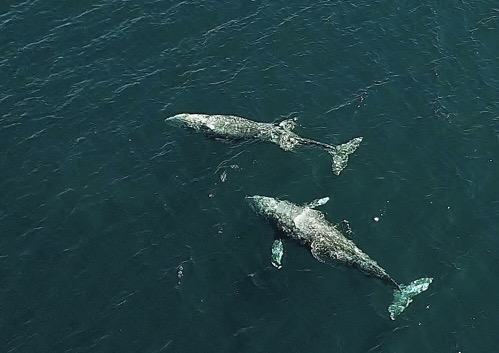
Gray Whales, California (Gabby Berghouse)
In Preparation for Chapter 3, I Researched the Science Behind What Happens When a Whale Dies at Sea.
Soon after the death, the whale’s inside organs begin to decompose, releasing gases and causing it to float up to the surface where it is scavenged by sharks and seabirds.
Eventually, the ocean giant will begin to sink, falling slowly, until finally coming to rest on the seabed. This phenomenon is know as a whalefall. The giant takes decades to sink to the ocean floor.
As it falls whales provide food for whole ecosystem of deep-sea creatures, from large scavengers to microscopic bacteria. Sea snails, bristle worms and shrimp devour any remaining scraps of blubber or muscle. The worms, such as Osedax mucofloris—a name which literally means 'bone-eating snot-flower'—bore their bacteria-filled roots into the whale’s bone, leaving their feathery plumes waving in the open water to take in oxygen.
In death the whales provide life for hundreds of marine animals for up to 50 years, proof of the vital role they play in the life cycle within Earth's oceans.
I Decide to Weave this Complex Process into a Poem
Chapter 3. Whalefall
A blinding, neon fork of lightning struck the tall pine close to the boulder Alysie had been standing on, momentarily blinding her with intense light. Alysie’s head fell back against the whale. Half dreaming, half conscious images flashed behind her eyelids. She felt as if she were tumbling down into an endless underwater canyon . . .
Down. Down. Down beneath the slow black, crow black sea
Deeper than sleep,
Dimmer than night!
Down. Down. Down beneath the slow black, crow black sea
Her eyes grow accustomed to the dark where
Seahorses, jellyfish and octopuses pulse beside her.
Down. Down. Down through silent, swaying forests of
Kelp and brown seaweed—Laminaria, Alaria, and Nereocystis,
Red seaweed—Porphyra and Palmaria.
“Will this fall never end?” the whale gurgled.
“Go to sleep, close your eyes, Natsilane,” Alysie crooned.
Down. Down. Down to where
Biting, ripping hag fish, sharks, and whales
Feast on Natsilane,
Gorge on his thick, rich blubber.
Down. Down. Down to where
Worms, barnacles, crabs, and mussels
Burrow into leftover muscle and bone.
Down. Down. Down into the sea of Alysie’s dreams where
Past, present, and future,
Flow, curve, and merge.
Down. Down. Down to where
Natsilane comes to rest on the bottom of the seabed
In the briny darkness where
The skulls of the long-drowned lie where
Tiny deep-sea scavengers—
Luminous worms, sea snails, and shrimps
Feed and breed on Natsilane’s skeleton
Down. Down. Down into deepest canyon where
Microbes mingle, consuming the whale’s cells
Swimming in methane gas bubbling from thermal vents,
And know nothing of the great grey whale.
Natislane, Oh, Natsilane . . .
Does this successfully weave scientific information in a poetic form? Email me at: cldatnow@me.com
Subscribe to my newsletter at: mediamint.net to read new episodes of “A Writer’s Journey.”
Coming Soon: Episode 4 “From Death Comes Life,” will reveal How a Whalefall is Connect to Climate Change.
ECO Fiction Writer's Blog Episode Two
Would you like to go on a journey with me to faraway places—one that takes unexpected twists and turns? You don’t need to pack a thing or purchase a ticket. I will be your guide as we travel through time and space, meet fascinating people, and gain a different perspective as I research and write my newest eco adventure, Whale’s Lament (working title). All you need to bring along is your curiosity and imagination and, of course, internet access. To receive my Newsletter with links to new episodes: subscribe by email: cldatnow@me.com. To begin reading “A Writers Journey: A Whales Lament,” visit my blog on: mediamint.net.
Send Your Questions and Ideas to cldatnow@me.com—they are most welcome
Our Journey begins in Nahoon, Alaska as Alysie Muckpa searches for the gray whale, she has named Natsilane:
Chapter One. Episode 2
The breakers swirled around the inky shadow in broad circles, then drained away as if sliding sideways from a submerged rock. As the shadow wallowed closer, Alysie could make out a huge, streamlined body and narrow head. Leaping off the boulder, she raced closer to the shoreline.
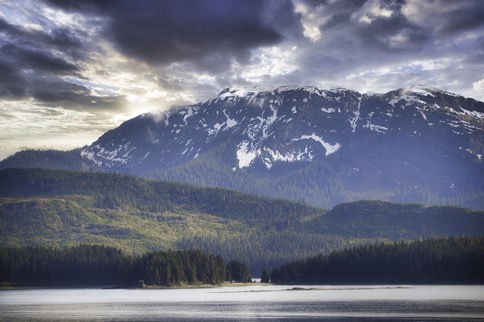
Storm Clouds Icy Point Straight Alaska (Boris Datnow)
There was something about its sluggish movement that made goosebumps prickle her arms. As if she were in a nightmare, Alysie could not turn away. “Calm down, get a grip!” she chided herself.
The body kept on rolling closer. The pull of the receding waves sucked it back pulled it forward. With each incoming breaker she could see the shape more clearly: the hump on its back, the line of knobs along its spine, its paddle-shaped flippers and broad tail. Push-pull, forward-backward. The ocean rocked the mighty whale in its arms, sending it closer and closer to shore where it would be stranded, trapped, unable to move its great body back into the water.
Alysie rushed into the churning ocean. Above the drumming of the waves slamming on shore and the thunder rumbling around the cove, she screamed “Natsilane stay away! Stay Away!” Pursing her lips tight over the tip of her conch shell she blew with all her might. Nothing happened. She blew again, AAAARRRRRUUUUUUUUUUUUUU! The wind tore the sound around the bay. But the incoming tide had Natsilane in its grip. As if she could shove a forty ton whale back into the ocean, she stood there with her hands outstretched. Still the whale kept on coming.
Dragging her eyes away, Alysie squeezed them shut and sent up a prayer to the Tlinglit warrior, Blackfish, who rode on the back of a whale.
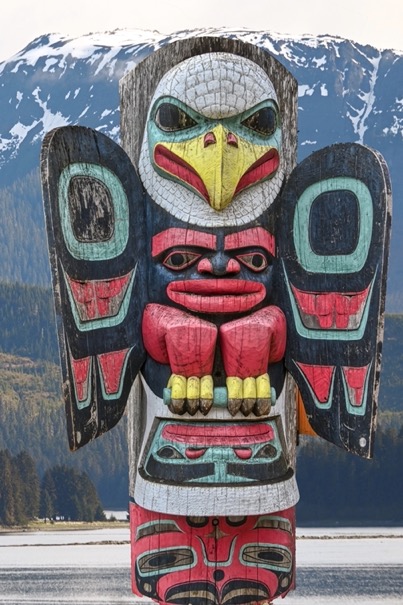
Tlingit Totem Pole Hoonah Alsaka (Boris Datnow)
A sour odor, like a shred of rotting fish, slammed into her. With a sick feeling in the pit of her stomach, her eyes flew open . . .
To read the next episode: Subscribe to cldatnow.
Send Your Questions and Ideas to cldatnow@me.com—they are most welcome
To inspire you along the way here are ideas, travel destinations, and books to enjoy.
Travel: Boris and I visited Alaska in 2019. The villages and towns we explored inspired the background to this story. We are planning to visit Baja California in February 2022 where gray whales migrate to the lagoons to mate and have their calves.
Documentary: Life Among Whales, streaming on PBS, narrated by Robert Payne.
Books: Fathoms: The World in the Whale by Rebecca Giggs
Ice Whale by Jean Craighead
Song for a Whale by Lynn Kelley
Articles: The Last Whaling Station in America http://www.lakata.org/arch/whaling.html
National Oceanic and Atmospheric Administration (and an exceedingly long list of other resources)
https://hakaimagazine.com/features/are-we-on-the-verge-of-chatting-with-whales/
Subscribe to my newsletter and blog at mediamint.net to read the next episodes.
Eco Fiction Writer's Blog Episode One
Claire Datnow's Writing Adventures
Would you like to go on a journey with me to faraway places—one that takes unexpected twists and turns? You don’t need to pack a thing or purchase a ticket. I will be your guide as we travel through time and space, meet fascinating people, and gaining a different perspective as I research and write my newest Eco adventure, The Whales Lament. All you need to bring along is your curiosity and imagination— and, of course, internet access. To begin this journey subscribe by email to: cldatnow@me.com
Note: The Whales Lament is the second book in a proposed cli-fi trilogy. Red Flag Warning: An Eco Adventure, first book in the trilogy, can be purchased from Amazon or downloaded on Kindle.
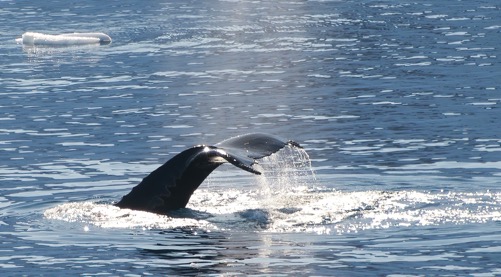
The Whale's Lament (Boris Datnow)
Our Journey Begins: Nahoon, Alaska as Alysie Muckpa searches for the gray whale, Natsilane:
Part One.
It is late spring on Chichagof Island, Alaska and the air and the water are warming. The bears have wakened from their long winter sleep. And all eyes gazing out to sea for the most graceful giants the gray whale. It is here they begin and end the longest migration of any mammal, 12,000 miles from the summer feeding grounds in the icy waters of the Arctic to their breeding grounds in the warm lagoons of Baja, Mexico—and back again with the changing seasons. This migration can take two to three months. Gray whales normally travel alone or in small groups. They surface only for a quick spout of air and breath before disappearing into the ocean. Instead of teeth, gray whales have baleen which is like a thick comb with long hairs. Diving down to the muddy bottom, they scoop up sediment form the ocean floor filtering out mud and trapping plankton and krill to eat. In the seventeen and eighteen hundreds whalers in search of oil hunted gray whales to near extinction. In 1946 and international treaty was singed to provide oversight and management of whale hunting. But it was under the protection of the Endangered Species Act in 1974 and National Oceanic and Atmospheric Administration’s (NOAH) careful management that the eastern pacific gray whale has recovered to a sustainable population. Today, nearly 24,000 gray whales continue their annual migration along the coast of North America, giving humans a glimpse of these majestic creatures that live in the deep. However, many factors still threaten gray whales including: vessel strikes, disruption of their migration routes, and entanglement in fishing gear. The whales that lived in the Western Pacific are no longer seen along the Asian shores. Baleen whales are acoustic animals and can communicate across entire oceans using vocalizations. Every species of whale speaks a unique "language" and scientists are still trying to learn what information whales communicate to one another.
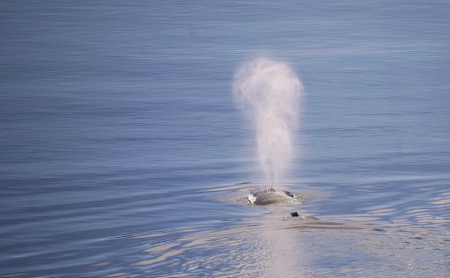
Spouting Whale, Antarctica (Boris Datnow)
Chapter One. Nahoon Alaska on Chicagof Island in the early spring.
Shading her eyes from the glow of the rising sun, Alysie Muckpa stood alone on the rugged cliffs gazing out to sea like a sailor longing for the sight of land. The wind tore at her hair, unraveled her braids and whistled in her ears. The night before, she had dreamed she was riding high on her whale’s back, with her black hair flowing behind her . . . steering him through the towering waves. With the dream still floating in her head, she had crept out of the house, carrying a backpack with snacks, water, a rain poncho, a flashlight, and her special whorled shell prepared to stay on watch even even if a storm broke.
Alysie ignored the gulls screaming by on near-gale gusts, and the plovers bobbing along the shore. The peregrine falcon winging swiftly across cliffs; the waves sloshing into the tide pools alive with hermit crabs, sea stars, sea cucumbers and sea urchins. On any other day, she would have lingered to marvel at the rainbow of creatures in the pool. On that day she kept her eyes focused on the ocean, searching for the misty spray of a whale or its dark shadow lurking beneath the water.
Something in the curve of the waves caught Alysie’s attention. A thrill tingled down her spine. Raising the binoculars to her eyes, she gasped in surprise. SUBSCRIBE to read more about what happens next.
To inspire you along the way here are ideas, travel destinations, and books to enjoy.
Send Your Questions and Ideas to cldatnow@me.com—they are most welcome
Travel: Boris and I visited Alaska in 2019. The villages and towns we explored inspired the background to this story. We are planning to visit Baja California in February 2022 where gray whales migrate to the lagoons to mate and have their calves.
Documentary: Life Among Whales, streaming on PBS, narrated by Robert Payne.
Books: Fathoms: The World in the Whale by Rebecca Giggs
Ice Whale by Jean Craighead
Song for a Whale by Lynn Kelley
Articles: The Last Whaling Station in America http://www.lakata.org/arch/whaling.html
National Oceanic and Atmospheric Administration (and an exceedingly long list of other resources)
YA/Teen Eco Fiction
Interview by Teresa K. Thorne with Kristina Handler, Illustrator, and Claire Datnow, Author
Teresa: Red Flag Warning: An Eco Adventure tells the dramatic story of three special young people from across the world, the amazing animals that are part of their lives, and the terrible threats they face—threats that affect the entire world. The three teens, all scarred by fire, struggle with the deeper wounds to their self-image and dreams. They must learn to respect the wildness of the animals they love and find their own voices, along with the power of community, in their mission to heal the Earth.
Eco Mysteries and Earth Day
Coincidence or Serendipity? Three historic events this April have coincided with a personal event that's meaningful to me and, hopeful, to my reader. This month marks the tenth anniversary of the BP oil spill, the fiftieth anniversary of Earth Day, and the ongoing Covid-19 pandemic. Wow! What are the chances of that happening? Could this be the universe reminding me of my passion for writing eco mysteries is important and should continue? I might also mention the strange coincidence of our stateroom # 1918, on our recent cruise to Antarctica, which coincided with the Spanish flue epidemic—and hinted at the Covid-19 pandemic. By sheer luck, the virus missed us, but infected the passengers on the next cruise—but that is a tale for another blog. Read More...
